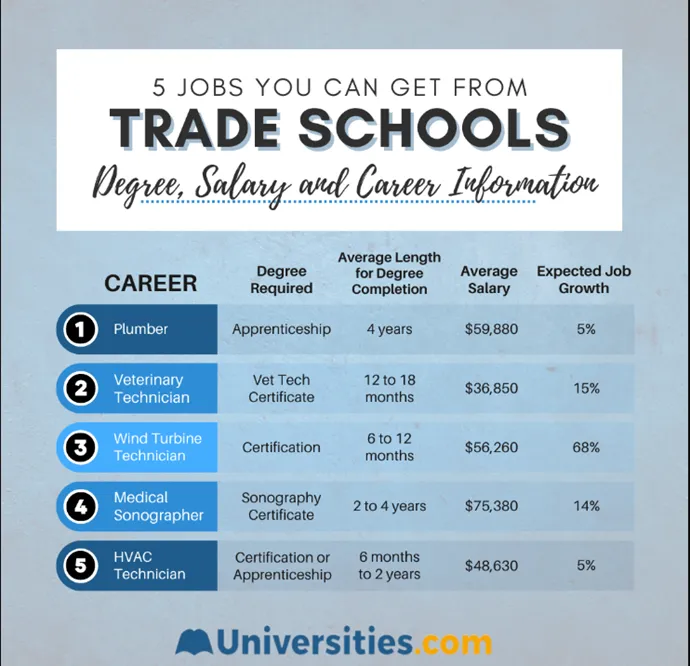Trade and Vocational Schools Guide for Previously Incarcerated

Have you heard of trade school or vocational school? If not, they are training programs for many careers, like welding, cosmetology, plumbing, and much more. In this post, we’ll talk about the benefits these programs offer as well as the steps you can take to get started—regardless of your past.
What is the Difference Between a Trade School and a Vocational School?
Trade schools generally offer:
- Hands-on skills and knowledge needed for a specific industry or occupation like a mechanic, plumber, locksmith, forklift operator, etc.
- Shorter programs that run from a few weeks to two years.
- A certificate of completion that validates the skills you learned or a professional licensure that indicates you passed the state required exam.
Vocational schools generally offer:
- A broader range of career-focused programs to equip students for a variety of jobs in industries such as agriculture, marketing, health, finance, and more.
- Longer program durations, ranging from several months to years.
- A certificate, diploma, or associate degree, depending on the program you choose.

What If You Have a Criminal Record?
Don’t worry, there are plenty of opportunities. Here are several ways to navigate education and employment with a past.
An easy way to find a trade program is with CareerOneStop’s search tool. It offers access to training programs and trade schools provided by the U.S. Department of Labor. To begin your search, simply enter a keyword and location. For the best results, use a specific trade, job title, school, or certification in the keyword section.
Find Training Today
More Ways to Find Information
- School admissions offices: Contact the schools you’re interested in, and they can tell you about their policies, background checks, and support for returning citizens.
- School websites: Check each school’s official website for details on admission, support services, and criminal record considerations.
- Licensure: Be sure to research the specific licensing requirements, as some might have restrictions related to criminal records.
- Potential employers: Reach out to companies in your field of interest and ask about their hiring policies for formerly incarcerated individuals.
- Legal aid: There are legal aid organizations that can help you understand your rights as it relates to education and employment with a criminal record.
- State and federal resources: Check for government initiatives or guidelines that support reentry into the workforce and education through the Reentry Employment Opportunities (REO) program.
- Networking and support groups: Ask others who’ve faced similar challenges if they will share tips and resources. Groups often hold their meetings at local churches, community centers and other public locations.
Policies vary between schools and employers, so be proactive and do your research. You can also visit our vocational and trade webpages for more information.
How to Find Free Training & Scholarships
Yes, they exist! Here’s how to find them:
- Government programs: Check out state and federal programs that support returning citizens with education and training.
- Nonprofit organizations: Look for organizations like the Safer Foundation or the Center for Employment Opportunities that offer training and education, job placement, and general reentry support and wellness services.
- Community colleges and vocational schools: Ask the school’s admissions office if they offer free or low-cost training programs for formerly incarcerated individuals, as well as scholarship opportunities.
- Scholarship sites: Use websites like Fastweb to find scholarships based on your interest and situation.
- Employment and Training Administration (ETA): The U.S. Department of Labor has programs accessible to justice-impacted individuals.
Job Opportunities to Consider
While getting a job depends on various factors, some industries are more open to hiring individuals with a record:
- Construction and skilled trades: Carpenters, plumbers, welders, and electricians are in demand, and employers often focus on skills and experience.
- Hospitality and food service: Restaurants, hotels, and catering services might offer entry-level jobs like kitchen staff or servers.
- Manufacturing and warehouse jobs: Assembly line workers, forklift operators, and warehouse associates are needed, and practical skills are key.
- Landscaping and groundskeeping: Landscaping companies and groundskeeping services often hire individuals who enjoy working outdoors.
- Trucking and delivery services: Obtaining a CDL and meeting other requirements can open doors in the transportation industry.
- Retail and sales: Cashier, sales associate, or stock clerk positions might be available in some retail sectors.
- Customer service: Call centers, support services, and entry-level customer service roles are great options and oftentimes, offer opportunity for advancement.
- Food production and processing: Packaging jobs, butchers and meat packers, poultry cutters and trimmers, food batch makers, cooks are a great option that offer on-site training.
Reentry Isn’t Just About Turning a New Page; It’s Writing a New Chapter
We are here to provide the resources and support you need to make that chapter a great part of your story.
Ready to get started? Begin your search by entering a keyword and location below, then click search.


